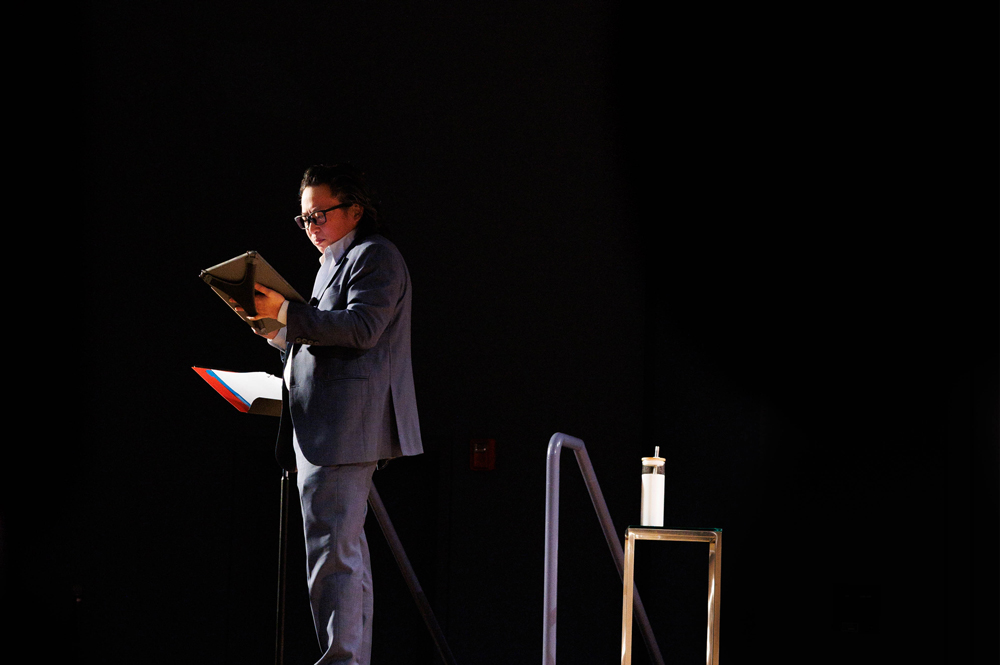/0x30:2240x1459/prod01/channel_34/media/seattle-university/news-amp-stories/magazine/fall-2025/Charles_Tung_Newstory.jpg)
From 'Back to the Future' to building futures, Professor Charles Tung is an academic leader helping shape the direction of SU’s curriculum.
Well before Charles M. Tung, PhD, wrote his 2020 book, Modernism and Time Machines—an exploration of time-travel in literature and the fixation on escaping the irreversible—the future professor of English and vice provost for academic programs was a kid attending a Jesuit high school in Phoenix.
Right at the beginning of his sophomore year at Brophy College Preparatory Tung’s father, Jimmy, died.
Amid his grief, and without having the language yet to explain why, Tung started seeking out literary works that dealt with the brevity and unstoppable passage of time. He also found something else that spoke to him: The power of story and narrative to lead readers to discovery, discernment and imagining possibilities.
“The origins of my scholarly interests are born out of that pain and wanting to change the past,” says Tung.
It wasn’t one book or one author that convinced him to become a literature professor, he says, but the way literature and fictional works like movies and TV shows are able to mobilize affect and engage feeling and thought together.
“When I was writing my book on time machines, I looked back to that moment when my father died in high school and it was the year that Back to the Future came out, 1985. So, I think those things are all related.”
A Professor of English at Seattle University since 2004, Tung also plays a central role in Reigniting Our Strategic Directions, Seattle University’s five-year plan to ensure students are prepared to engage with the greatest challenges facing society, including climate change and sustainability, racial injustice and widening economic inequity and rapid technological changes and their impacts. Tung’s remit was Goal 1, “Revise and Reimagine Our Curriculum,” which included taking a close look at SU’s Core Curriculum, the foundational courses taken by all undergraduates.
Student success is at the heart of SU’s push to update its Core and align it with the Jesuit value of caring for the whole person. Tung says when considering changes to the curriculum it’s not a matter of simply pushing out the old and starting over fresh, but maintaining what is successful, while simultaneously seeking new ways to engage students. He commends the professors and administrators for their approach. “My colleagues approached curriculum revision in a very thoughtful and I would say bold way,” he says of decisions to change some courses and lessons and retain others.
The professor is an eloquent emissary for SU’s drive to update its curriculum as he knows firsthand how Jesuit education pushes students to understand the world to transform it.

At a time when students are increasingly questioning the return on investment of higher education, Tung says there must be a balanced focus, both on careers and on the human being who will be working that profession.
“That makes a difference in the kinds of nurses and businesspeople and engineers we produce as a Jesuit institution,” he says. “And likewise, this balanced approach of Jesuit education makes a difference in the types of artists, writers and humanists that we produce also.”
After high school Tung continued his Jesuit education, devoting his attention to English literature, attending Georgetown University, where he met his wife, Chau. After graduating, he attended St. Cross College at Oxford University through an inaugural scholarship for Georgetown students, earning his master’s degree.
Following his sojourn in England, he returned to the U.S., earning his PhD in 2004 from the University of California, Berkley. Though he had been interested in exploring the concept of time, it was here where his focus shifted in earnest to the subject that would occupy his scholarly life.
At the most basic level, Tung sees in himself a high school boy who’s still living in 1985, and out of that period comes a fascination with time as explored in literature.
The study of time becomes a very powerful intellectual device rather than just an escape or fantasy, he says, before quickly clarifying, “I don’t put myself above escapist fantasy,” freely declaring his love of reality TV and all forms of science fiction.
“I have both a deep research interest and an abiding love for just really bad popular culture,” he says, with a laugh. He particularly likes sharing it with his kids, Sophie, a junior at SU, and Ambrose, a sophomore at West Seattle High School, but so far they haven’t shown an appreciation for such broad fare.
The medium Tung employs to explore these concepts is his life’s passion, teaching.
“I think I wanted to be a teacher ever since I was so deeply transformed by my high school experience,” he says, but adds that his love of teaching fully formed when he arrived at SU. While listening to an external reviewer talk about teaching, he was struck by something the reviewer said.
“We all know what teaching is,” Tung recalls the words. “We just teach what we research.” At a research university, instructors often think about teaching as covering the topics of their research, Tung says.
“And that’s so very different from the character of this institution. And I would say Jesuit education broadly. Jesuit education cares about all the students learning and succeeding.”
/0x42:2400x1558/prod01/channel_34/media/seattle-university/news-amp-stories/images/Seahawks-dancer-photo.jpeg)
/0x42:2400x1558/prod01/channel_34/media/seattle-university/news-amp-stories/images/Charles-Pigott-photo.JPG)
/0x83:2000x1346/prod01/channel_34/media/seattle-university/news-amp-stories/images/McGee-lecture-Victor-photo.jpg)